Dr. ElBaradei, IAEA Director General, Special Event and Lecture
Opening Address
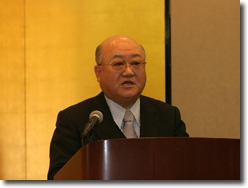
Mr. Yuichi Tonozuka
President of Japan Atomic Energy Agency(JAEA)
Mr. Tonozuka began the special event presentation by welcoming all in attendance, especially Dr. Mohammad ElBaradai, Director General of the International Atomic Energy Agency (IAEA). The JAEA President continued by noting the importance of the IAEA as evidenced by the awarding of the Nobel Peace Prize to the Dr. ElBaradai and the IAEA in 2005 for their efforts to ensure the peaceful global use of nuclear energy.
Mr. Tonozuka noted that nuclear proliferation is a topic seen daily in the news. In addition, the current demand for energy, especially in the Asia sector, is growing steadily. Increasing oil prices also spurs the need for increasing nuclear energy use and development. However, this growth challenges the current nuclear nonproliferation status quo. Therefore, the IAEA has risen to meet the new challenges by adding the Additional Protocol to strengthen the existing Safeguards of the Non-Proliferation Treaty (NPT). Despite these actions, the changing state of current international affairs presents new issues that will require a new framework to address future nonproliferation concerns. IAEA held a special event entitled "New Frameworks for the Utilization of Nuclear Energy in the 21st Century: Assurance of Supply and Non-proliferation" in September 2005 to lead the international discussion on a new framework for strengthening nuclear nonproliferation regime. To further these goals, Mr. Tonozuka expressed his desire for the JAEA to continue to support the IAEA on global nonproliferation issues. The Nuclear Nonproliferation Science and Technology Center forms a core within the JAEA to address nonproliferation issues with global counterparts, including the IAEA.
An important aspect of the future of safe and peaceful use of nuclear energy are the people involved in the related science and industry. The JAEA President noted that many nuclear energy students from local universities, including the Tokyo Institute of Technology, were attending the special event to hear Dr. ElBaradai. Because they are the next generation and represent the future, Mr. Tonozuka encouraged the young people in the audience to engage in dialog with Dr. ElBaradai during the question and answer session. He closed his remarks by thanking all of the organizations present, and also those that participated in holding the special event, including the Ministry of Foreign Affairs, the Ministry of Education, Culture, Sports, Science and Technology, and the Tokyo Institute of Technology.
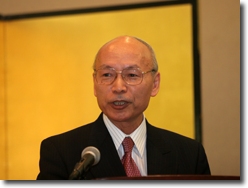
Dr. Masuo Aizawa
President of the Tokyo Institute of Technology
Dr. Aizawa began his welcome by noting that the Tokyo Institute of Technology is a science and technology university that places an emphasis on energy technologies, including nuclear energy research conducted at Research Laboratory for Nuclear Reactors. He noted that the public in Japan are concerned over nuclear safety issues and ensuring that radiation is not released into the environment. Another important aspect regarding nuclear energy is to ensure that nuclear technology and materials are not diverted.
Dr. Aizawa expressed his pleasure at the opportunity to hear Dr. ElBaradai's speech and noted that the Tokyo Institute of Technology has a history of involvement with the IAEA. These interactions include PhD students working as interns at the IAEA, and an IAEA workshop on Nuclear Knowledge Management hosted by Tokyo Institute of Technology in October 2007.
Dr. Aizawa also noted that many university students were present in the audience. He emphasized the importance of the development of nuclear technologies and the research ongoing at the Tokyo Institute of Technology. Dr. Aizawa expressed his expectation and hopes that Dr. ElBaradai's speech would have a strong guiding impact and influence on these students as they pursued their academic and professional careers, as they are the generation that will carry the goal of safe and peaceful nuclear energy use into the future.
Summary
NUCLEAR POWER: PREPARING FOR THE FUTURE
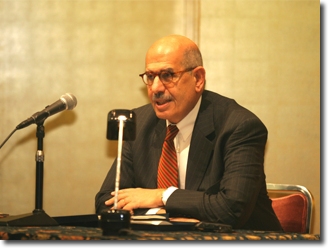
- The partnership between Japan and the IAEA has a long history of shared objectives, ranging from the safe and secure use of nuclear power and other peaceful applications to nuclear non-proliferation and disarmament.
- The two major concerns facing humanity today are the pressing need for development in many parts of the world; and the importance of ensuring an effective system of international security. Energy is essential for development and it is important to consider the global energy balance.
- According to the World Energy Outlook 2006 by the International Energy Agency (IEA) of the Organization for Economic Cooperation and Development (OECD), if current consumption trends and government policies continue, we will see a 53% increase in global energy consumption by 2030. Two aspects of this analysis are especially interesting. The first is the expectation that 70% of the coming growth in demand will be from developing countries. The second is that, for the first time, the IEA said the increased use of nuclear power would help to meet the increase in energy demand, enhance the security of energy supply and mitigate carbon emissions.
- Nuclear energy alone is not a panacea, however, it is likely in the near future to have an increasing role as part of the global energy mix.
The Current Global Status
- Recent expansion of nuclear power reactors has been most heavily centered in Asia, including China and India. Indonesia, Vietnam and Turkey are planning to introduce nuclear power programs.
- The expanded G8 Summit in St. Petersburg this summer emphasized the importance of 'global energy security'. During my participation at this summit, I emphasized that global energy security means fulfilling the energy needs of all countries and peoples.
Reasons for the Renewed Interest in Nuclear Power
- For many countries, nuclear power is a way to enhance the security and diversity of their energy supplies as well as to contribute to reduce the carbon emission from fossil fuels.
- Nuclear power is a mature technology, with more than half a century of operating experience. And the past two decades, have seen significant improvements in plant reliability, lower generating costs, and progressively improved safety records.
Key Aspects: Safety, Security and Non-Proliferation
- For nuclear power to continue to be viable as a source of energy, it is vital that nuclear operators continue this strong performance. In this context, let me turn to a number of the concerns about nuclear power, and discuss how they are being addressed.
Nuclear Safety:
The Chernobyl accident in 1986 was clearly a setback to nuclear power. But ironically, this event also promoted major improvements in our approach to nuclear safety. A key change was the development of a so-called international 'nuclear safety regime'. International conventions were put in place, creating legally binding norms to enhance the safety of nuclear activities. A systematic analysis of risk was used to ensure that safety upgrades would be made in areas that would bring the greatest safety return. Both the IAEA and the World Association of Nuclear Operators (WANO) created international networks to conduct peer reviews, compare safety practices, and exchange operating information to improve safety performance.
Nuclear Security:
Nuclear Security has also become a major concern in recent years. The IAEA has worked on every continent to help countries better control their nuclear material and radiological sources and protect their nuclear facilities. While much remains to be done, nuclear installations around the world have added protective barriers and taken other measures to counter security risks and vulnerabilities.
Management of Spent Fuel and Disposal of High Level Radioactive Waste:
The management of spent fuel and disposal of high level radioactive waste remain a challenge for the nuclear power industry. The greatest progress on deep geological disposal has been made in Finland, Sweden, and the United States. Research is also processing on the use of fast reactors and accelerator driven systems to incinerate and transmute long lived waste.
Nuclear Non-Proliferation:
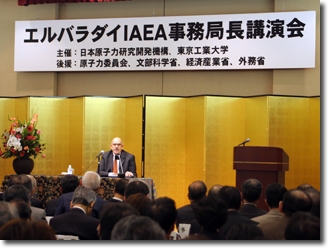
- Perhaps the most serious concern relates to the proliferation of nuclear weapons. At the same time that we are seeing rising expectations for nuclear power, we are also witnessing concerns relating the spread of sensitive nuclear technology, such as enrichment and spent fuel processing - activities that are part of a peaceful nuclear program, but also can be used to produce the high enriched uranium and plutonium used in nuclear weapons.
- The recent nuclear weapon test by the Democratic Republic of Korea (DPRK) has brought the need to control the spread of enrichment and reprocessing capability sharply into focus. This event also re-emphasizes the urgent need to establish a universal ban on nuclear testing.
- I am pleased to note that the recent agreement to resume the six-party talks. The IAEA stands ready to work with the DPRK towards a solution for this issue that would make use of the Agency's verification capability.
- Under NPT safeguards agreements, we inspect countries to verify that their peaceful nuclear programs are not used as a cloak to divert material to non-peaceful uses. But 30 States still have not fulfilled their legal obligation to conclude a comprehensive safeguards agreement - and over 100 States have yet to bring additional protocol into force.
- As more countries industrialize, controlling the spread of technology is becoming increasingly difficult. For some time, I have been advocating that we consider a multinational approach to enrichment and reprocessing. This would occur in two steps.
- The first step would create a mechanism for the 'assurance of supply' of nuclear fuel, possibly including a fuel bank to be managed by the IAEA. For countries that use nuclear fuel for electricity generation, this mechanism would serve as a supplier of last resort, thereby removing the risk of having their fuel supply interrupted for noncommercial reasons. It would also reduce the motivation, and the justification, for new countries to invest in theses proliferation sensitive operations.
- The second step would seek to bring any new operations for uranium enrichment and plutonium separation under multinational control. Over time, these multinational controls would also be extended to facilities that already exist - to ensure that all countries are treated equally in terms of their nuclear capabilities.
- Several countries, while supportive of the overall concepts, want to be sure that it would not disrupt the functioning of the existing nuclear fuel market. Countries that already have some enrichment capacity hoped that a new mechanism would not disrupt their ability to build up a national fuel reserve, or their capacity to export fuel. The IAEA Secretariat is considering those insights and concerns and aims to develop set of ideas to present to our Member States. I look forward to working with all our Member States to move this concept forward.
Technological Innovation
- The future of nuclear power will also be greatly impacted by technological innovation. Current nuclear R&D projects, such as "International Project on Innovative Nuclear Reactors and Fuel Cycles (INPRO)", the "Generation IV International Forum (GEN-IV)" and "Global Nuclear Energy Partnership (GNEP)", are naturally focused on enhancing nuclear safety, reducing proliferation risks and improving economic performance. Many developing countries have been particularly interested in efforts to develop small and medium-size reactor designs.
- ITER: The formal Agreement was signed among the parties earlier this month. ITER is to provide a scientific and engineering demonstration of fusion technology in conditions relevant to operating a fusion reactor for power production.
Public Perception of Nuclear Power
- The public perception will be important in determining the future of nuclear power. All members of the nuclear community - scientists, operators and safety regulators - should make every effort to provide accurate and easily understood information to improve public understanding of the risks and benefits of nuclear energy.
Japan and the IAEA: Partners for Common Objectives
- For many years, Japan has been a strong and supportive partner of the IAEA. Japan has been a regional and global leader in assisting other countries with peaceful nuclear applications. Japan has the largest nuclear program under IAEA safeguards and it is also one of the countries in which we implement integrated safeguards - which involves integrating traditional nuclear material verification activities with new strengthening measures for greater effectiveness and efficiency.
Conclusion
- The IAEA assists countries not only in the area of nuclear power, but in many other peaceful nuclear applications. Today, I have tried to outline the conditions under which nuclear power could continue to contribute to development and security. At the IAEA, we stand ready to assist Japan and other partners around the globe in finding solutions that are best suited to their needs and priorities.
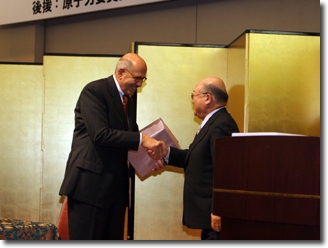
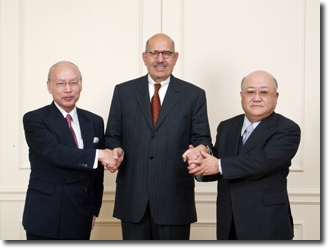
Closing Remarks
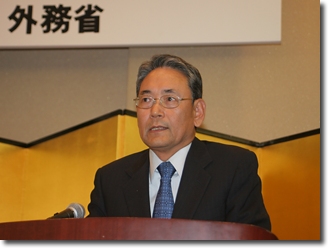
Mr. Toshio Okazaki
Executive Vice President of Japan Atomic Energy Agency(JAEA)
Mr. Okazaki closed the Special Event and lecture of Dr. ElBaradai by expressing kind words of appreciation to all. He concluded by acknowledging that proliferation concerns affect the development of safe nuclear energy. Furthermore, he emphasized that Japan desires the peaceful use of nuclear energy and rejects nuclear weapons. There is a current need to step up efforts on the peaceful use of nuclear energy and nonproliferation. The NPT is the basic framework for nonproliferation and requires the world's participation. Also, there is a need and expectation for more engagement by nuclear States on disarmament and developing stable fuel supplies. Finally, Mr. Okazaki emphasized the JAEA's desire for supporting nonproliferation for nuclear energy. In closing, he kindly thanked everyone once again for their participation, especially acknowledging the students and young professionals in the audience.
